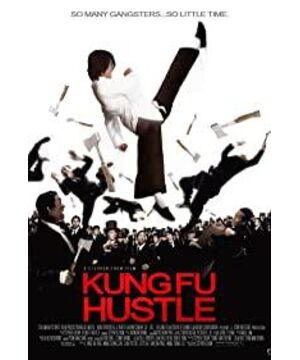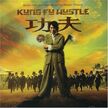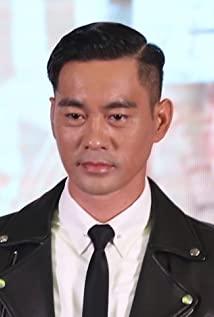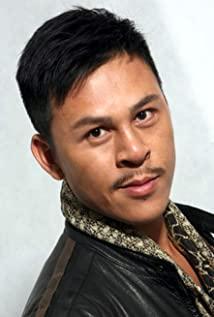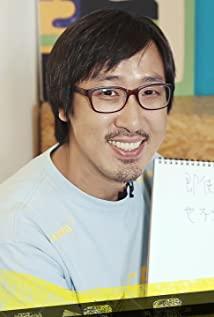There is a movie poster showing Zhou Xingchi holding an axe in one hand and a lollipop in the other, with two different groups of people standing behind him on the left and right sides. He lives in the middle of good and evil. This is a clear symbolic expression, one will become a demon and one will become a Buddha, which completely conveys the theme of the split between good and evil in the film.
The core of "Kung Fu" tells a story about "turning a butterfly". At the end of the film, A Xing broke free from the bandage symbolizing the cocoon, and completed a qualitative transformation from weak to strong, from evil to good. The initiation process of this layer of transformation begins with the confrontation with the Evil God of Fire Cloud. The Evil God of Fire Cloud symbolizes the object of sadism. He actually implies the desire for destruction in A Xing's heart. In the film, he comes from a mysterious and solid building (the madhouse is a buried image), and others describe the Huoyun evil spirit as "so obsessed with martial arts that he goes crazy", which is the same as Ah Xing's childhood obsession with kung fu and forgetting reality Psychology is a crazy and paranoid mentality. He is the repressed tiger in Ah Xing's heart, a powerful shadow of a sleeping personality. Just like the image of the tiger in "The Fantastic Drifting of Pi", the tiger is the fierce self-power in the heart of the protagonist "Pi", and controlling the wildness of the self is the arduous task of growth. In "Kung Fu", A Xing uses his powerful repair ability to resolve this impulse of death. At the end of the film, A Xing pulls out the poisonous needle of the Fire Cloud Evil God's hidden weapon, symbolizing the transformation of destructive power into creativity.
The film implies that the renter and the renter are A Xing's parents. This is a hidden line in the story that is not very obvious, but it supports the psychological construction of the story. Using this as the starting point for analysis, we can see that there is a separate individual behind the story. It has undergone the integration and repair of fragmented objects. The idea of the chartered public servant and the chartered wife to let their children be doctors or lawyers is consistent with Ah Xing's self-reported exchange of money from studying to be a doctor or lawyer for martial arts secrets. The chartered man and the chartered wife mistakenly thought that their son had been beaten to death in a competition, and Ah Xing, who had amazing self-healing ability, could not be beaten to death, and this ability could make Ah Xing escape from death. Connecting the two clues, the child who was expected to be a doctor or a lawyer was Ah Xing. "Immersed in fantasy and affected the development route of secular life, but in the end, it was reborn with the wealth of fantasy." This mental journey in the movie vaguely echoes Zhou Xingchi's growth trajectory in reality. fantasy, and these imaginations allowed him to bloom in the film industry in the future.
If the movie is a dream, then Zhulongzhai symbolizes the place where the director lived in his early years. The space is cramped and the material is insufficient. The center of power here is the image of the mother symbolized by the renter. Zhulongzhai is experienced as being controlled by the strict maternal superego. The psychological space in which male characters are invariably submissive, where masculinity is suppressed. In the movie, the threat of water and power outages by the chartered wife is like the threat to the survival of young children in front of their breasts. The children depend on their mothers and receive blessings while being punished. The harmony here is actually brought about after being suppressed. The pig cage village is a refuge from reality, but the price of hiding here is to limit the development of male power. The typical product of relying on the mother to refuse castration is the role of Jiang Bang. Jiang Bao represents an "idiot self", a self completely outside the symbolic world. He is a role that cannot be defined by the world, and a waste who lives completely in the inner world. material. Sauce burst in a lot of Stephen Chow movies, and its implied meaning is to show the part of the heart that still refuses to be born. Another famous guest role in Stephen Chow's films is "Ruhua", which is a masculine woman (or a feminine man), homosexual, and gender confusion. This role function is probably mainly used to defend the innermost homosexual impulse. . (There are also gay characters in kung fu. He is the femininity of the Hong family iron line fist. In the film, he was "molested" by the charterer.)
In the movie, it is said that the Zhulongzhai community and the gangs are two worlds. These are two psychological spaces, and it is the relationship between the mother's position and the father's position. The outside world is dominated by the patriarchal power symbolized by the Axe Gang Boss, a symbol of a stern paternal superego who can do whatever he wants, be brutal and powerful. After agreeing with the male law, A Xing decided to assassinate the charter woman, which led to the collision of the two worlds and the flashpoint of the psychological crisis. The Axe Gang's crushing of Zhulongzhai echoes the domestic violence incident between the chartered public servant and the chartered wife (the confrontation between male power and female power). For Ah Xing, this means switching from identifying with his mother to identifying with his father. After agreeing to the brutal male law, Ah Xing has two specific performances. The assassination of the charterer echoes the axe helping the boss to kill women on the street. The robbery of the dumb girl's ice cream echoes the childhood bad boy's robbery of the dumb girl's lollipop. Identifying with the attacker in order to gain masculinity is defending masculine power by attacking women. The attack and protection of Zhulongzhai (echoing the attack and protection of the dumb girl) is the expression of A Xing's contradictory feelings towards the image of his mother in his heart. The power of hatred dominates the separation, but hatred has triggered a deeper crisis of division, so the attack The power must be integrated by the repairing ability (love). The destruction of the object is driven by the divided evil part of the self. Guarding the lollipop and protecting the renter are the good parts of the self. Although the good is suppressed, the good always exists. From the perspective of Melanie Klein's theory of object relations, the intense and chaotic fighting in the film is a psychological crisis dominated by hatred. The subject must avoid being destroyed by the sadistic object and protect the sadistic object from being Shattered by his own sadistic impulses, this is an inner state of being in a dichotomy of good and bad. The process of resolution is to use love to integrate hate, and the process of integration is a painful and difficult developmental achievement. The so-called world peace is a metaphor for restoring inner peace.
In the movie, A Xing's power is activated by the wicked, and "opening up the two veins of Ren and Du" has a symbol of castration (he also obtained it by controlling the power of the self). Castration brings the subject from the imaginary self into the symbolic self, so that the once imaginary Tathagata palm can exert its power in reality. Huoyun Evil God is an image of a castration that emerges from the heart. He compensated for a castration procedure for A Xing's fatal blow, which became the key to transforming a butterfly. "Wu Zhuangyuan Su Qi'er" has a similar story structure. Ah Can, who suffered from broken bones and broken bones, has ushered in a turning point since then. It is very symbolic that Ah Can, who is illiterate, began to learn to write after breaking his bones. The image of the text is just right is accompanied by the symbolic self.
View more about Kung Fu Hustle reviews


